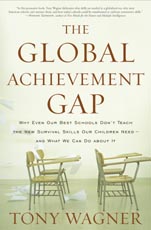 The Global Achievement Gap: Why Even Our Best Schools Don't Teach the New Survival Skills Our Children Need--And What We Can Do About It
The Global Achievement Gap: Why Even Our Best Schools Don't Teach the New Survival Skills Our Children Need--And What We Can Do About It
Basic Books, August 2008
Despite the best efforts of educators, our nation’s schools are dangerously obsolete. Instead of teaching students to be critical thinkers and problem-solvers, we are asking them to memorize facts for multiple choice tests. This problem isn’t limited to low-income school districts: even our top schools
aren’t teaching or testing the skills that matter most in the global knowledge economy. Our teens leave school equipped to work only in the kinds of jobs that are fast disappearing from the American economy. Meanwhile, young adults in India and China are competing with our students for the most sought-after careers around the world.
Education expert Tony Wagner has conducted scores of interviews with business leaders and observed hundreds of classes in some of the
nation’s most highly regarded public schools. He discovered a profound disconnect between what potential employers are looking for in
young people today (critical thinking skills, creativity, and effective communication) and what our schools are providing (passive learning environment and uninspired lesson plans that focus on test preparation and reward memorization).
He explains how every American can work to overhaul our education system, and he shows us examples of dramatically different schools that teach all students new skills. In addition, through interviews with college graduates and people who work with them, Wagner discovers
how teachers, parents, and employers can motivate the “net” generation to excellence.
An education manifesto for the twenty-first century, The Global Achievement Gap
is provocative and inspiring. It is essential reading for parents, educators, business leaders, policy makers, and anyone interested in seeing our young people succeed as employees and citizens.
hardcover | ISBN: 9780465002290 | Publication Date: August 2008
Reviews:
“In this persuasive book, Tony Wagner delineates what skills are
needed in a globalized era, why most American schools can’t
nurture them, and how today’s schools could be transformed to
cultivate tomorrow’s skills.”
—Howard Gardner, author of Minds for the Future and Multiple Intelligences
“Wagner is not just talking about our schools here – he is
talking about the future of our nation. The Global Achievement Gap cuts
through the complexity and partisan posing so often associated with
this genre. It is a powerful call to action, and a roadmap of how to
fundamentally rethink the education of our children. If we ignore it,
we do so at great peril.”
—Keith R. McFarland, best-selling author of The Breakthrough Company: How Everyday Companies Become Extraordinary Performers





